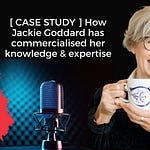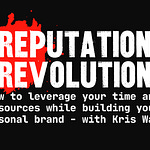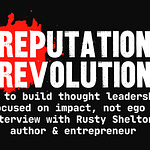We’re back for a new season (#6) of the REPUTATION REVOLUTION podcast - available now from your favourite podcast app, including Apple Podcasts, Amazon Music and Spotify.
Business brand vs personal brand: Which one should you focus on?
It's a question I get asked a lot, and one to which there is no definitive answer, as a number of variables will often come into play.
But ... it's definitely worth digging into if you're in business, because as we know: when it comes to all things PR, marketing and communications (including content and social media) - clarity is king!
To help me tackle the 'business brand vs personal brand' debate, I've co-opted two experienced pros to provide their ideas, insights and opinions on the topic.
They are:
SAM OSBORN - a leading brand strategist who helps businesses drive stronger revenue, branded communication and customer love
BRENDAN KEOGH - a marketer and coach who helps thought leaders clarify their message and create cut-through content that gets results
Sam, Brendan and I provide our respective takes on the 'business brand vs personal brand' theme.
Along the way, we also discuss:
the concept of branding, and the critical role it plays
the importance of values, personality and consistency in building trust
examples of personal brands who have also built significantly-sized businesses
The role reputation plays in personal branding
Leaders of practice areas within a larger firm: how should they approach personal branding?
Brand architecture, and when to build a 'house of brands'
If you're building a business enterprise around your personal brand but are wondering whether or not you need to put a bit of effort into marketing an associated business entity, then you might find this episode interesting!
Okay, now scroll down to see my take on things … numerous real-life examples included!
Gary Vaynerchuk: Personal brand leverage in action!
I tend to veer towards the camp of build your personal brand first, especially with the abundance of opportunities that come with being a key person of influence in today’s Reputation Economy.
I think someone who's managed to do this very successfully is Gary Vaynerchuk.
Like him or not, Vaynerchuk’s name - once he thrust himself into the spotlight - opens doors.
Of course, it wasn’t always that way.
Back in the early days of YouTube and social media, Vaynerchuk was a nobody, just one of many would-be entrepreneurs plying their trade in obscurity.
Grabbing the reins of his father’s local New Jersey liquor store (then named Shoppers Discount Liquors, now Wine Library), he grew it from $3-60MM in sales during his tenure.
During his time at Wine Library, Vaynerchuk started one of the first long-form episodic video shows on YouTube in 2006 called WineLibraryTV. He produced an episode almost every day for five years, eventually landing him appearances on national TV with Ellen Degeneres and Conan O’Brien.
Vaynerchuk continued to elevate his profile, and then set about leveraging his brand by setting up a new social media agency business - Vaynermedia
This, from Vaynerchuk’s own website:
In 2009, after walking away from Wine Library TV, Gary and his brother AJ, who had recently graduated from college, founded VaynerMedia, an agency focused on helping large brands tell their stories on social media. Securing early clients like the New York Jets, and the NHL allowed them to scale at a rapid pace, outgrowing three offices, and scaling to over 500 employees in just six years. VaynerMedia now represents Fortune 500 clients like General Electric, Anheuser-Busch InBev, and Pepsi-Co, and recently announced their move to Hudson Yards, Manhattan’s hotly anticipated, multi-billion dollar development.
By the time he set up his own agency, Vaynerchuk’s name - his personal brand - was up in lights. Today, Vaynerchuk is involved in a bulging portfolio of businesses, but it was Vaynermedia that kicked off everything post-Wine Library.
I can say with confidence, had Vaynerchuk’s profile not been as big as it was at the time, there is no way Vaynermedia would have launched in the way it did, with clients, buzz and instant cred.
Business brand or personal brand? My take ….
In Vaynerchuk’s case, his personal brand acted as the vanguard. His various businesses, Vaynermedia included, have all benefited from his name and influence, and now are paving their own way to branding success.
Brian Clark doesn’t care about personal branding
Another interesting example of business vs personal brand is BRIAN CLARK, who has established and sold several 8-figure businesses, including StudioPress and Rainmaker Digital.
Clark is the founder of Copyblogger, the midlife personal growth newsletter Further, and Unemployable, an educational community that provides strategies for freelancers and solopreneurs. He is also co-founder of Copyblogger's content marketing and SEO agency.
In the digital entrepreneurial world, he’s big time. A legit player with consistent runs on the board, both in terms of content marketing and building digital businesses.
“I never concern myself with my ‘personal brand’. It’s far better to build something bigger than yourself. Then your personal brand will take care of itself.”
I don’t disagree with him, by the way. Consistently delivering value to a defined audience, as he recommends, to me is a key part of personal branding, so I’m not going to get into semantics here.
More so, it’s Clark’s take on building businesses that interests me.
Build something bigger than yourself. In doing so, you’re creating something - an business entity - that becomes its own brand.
It’s why Clark has been able to sell several of his businesses.
Yes, he personally was was tied up with the brands, but he wasn’t seen solely as the only one involved. While they no doubt benefited from his status within the industry, they were strong enough brands to stand alone and from that perspective, were seen as ideal acquisitions for the companies that bought them.
Business brand or personal brand? My take ….
As I mention in the podcast: If your goal is to build and sell a business, then of course, building the business brand more so, or equally to your own personal brand, is a must. But you need an awareness of this from the outset. Well, preferably …
The Clark example is an interesting one. He has built his personal brand in concert with one or more business brands (Copyblogger being the initial ‘rocket ship’).
A win-win situation for all concerned from where I sit!
Cindy Gallop: "I like to blow shit up. I am the Michael Bay of business."
Cindy Gallop pitches herself as the ‘Michael Bay of business’. She is a “brand and business innovator, consultant, coach and keynote speaker, available to work with anybody who wants to change the game in their particular sector”.
She says: “Come to me for radical, innovative, groundbreaking, transformative - I don't do status quo.”
Cindy is your classic personal brand-based enterprise. She is the business!
That doesn’t mean she hasn’t got other businesses or projects on the side (e.g. MakeLoveNotPorn.TV, the “World’s 1st user-generated, human-curated #socialsex video sharing platform”).
But she is the speaker.
She is the consultant.
She is the coach.
She is the influencer available for suitable partnerships.
She is the brand.
Business brand or personal brand? My take ….
And we’re seeing more and more of this business model today, where credible individuals build a strong and credible personal brand and then grow a portfolio business around it. Some have as many as 20 streams of income!
(Of course, you’ve also got an outlier like Seth Godin, ahead of his time as is his wont, who has always thought of his career as a series of projects, not jobs).
Michael Hyatt & Full Focus: From personal brand to business brand
And finally … this is not covered in the podcast, but the example is a good one.
Just so we have a good counter-balance here: US businessman-turned-blogger, Michael Hyatt, came to prominence around 2012 with the release of his book, ‘Platform: Get Noticed in a Noisy World’, which became a bit of a bible of personal branding at the time.
In those days, Hyatt’s business was very much about him. He was the brand: the speaker, the podcaster, the blogger, the author.
Then the name Michael Hyatt & Company became a bit more prominent. Michael was still integral to the business, but it was obvious it had become a bigger operation, much bigger than just Michael (his daughter Megan Hyatt Miller also started taking centre stage a bit more).
Now, more recently, Michael Hyatt & Company has become Full Focus. It’s still a performance coaching company, but with a bigger vision, backed by a growing team.
“At some point, I crossed the line where it was no longer about me. It’s about us,” Hyatt says about the change.
But more relevant to this edition of the newsletter (and episode of the podcast), Hyatt’s move puts perspective around the ‘personal Brand vs business brand’ issue.
Thus, I’ll leave the last word to Michael Hyatt:
“If you want to build a company fast, do it on a foundation of a personal brand. If you want to build a company to last a long time, don’t do that.”
So, as you can see, there is no right or wrong. Just what’s right for you, your business and your future. And, of course, people evolve, as do businesses.
Things invariably change. The key is to have purpose and direction, and be flexible enough to change tack if and when that’s required.
Good luck!
Thanks for listening!
Trevor 💪
P.S. You can check out the full playlist of Reputation Revolution podcast episodes here.
Website | Twitter | LinkedIn | Podcast | Books
COMING SOON: The Credible Authority Academy

















Share this post